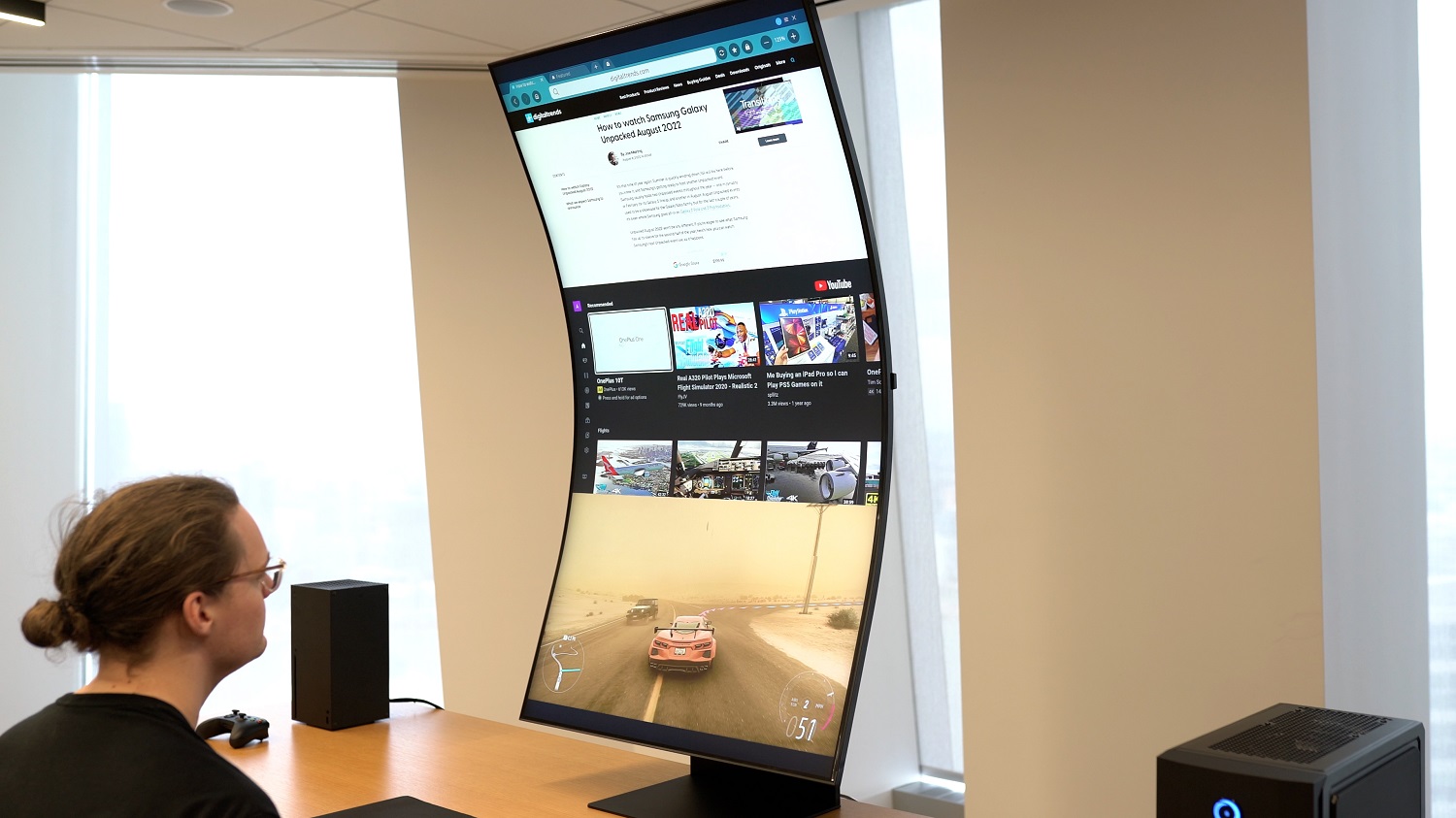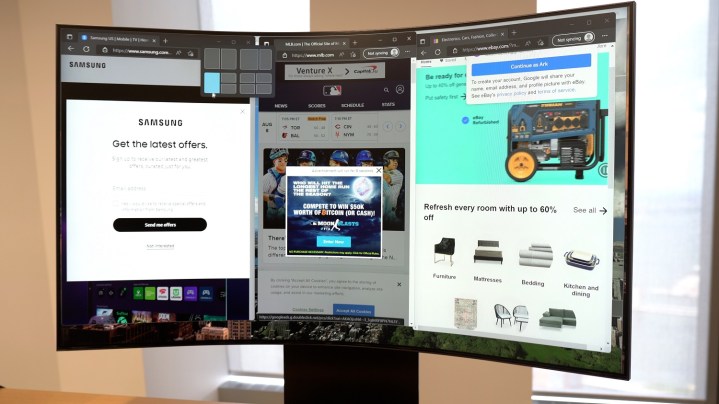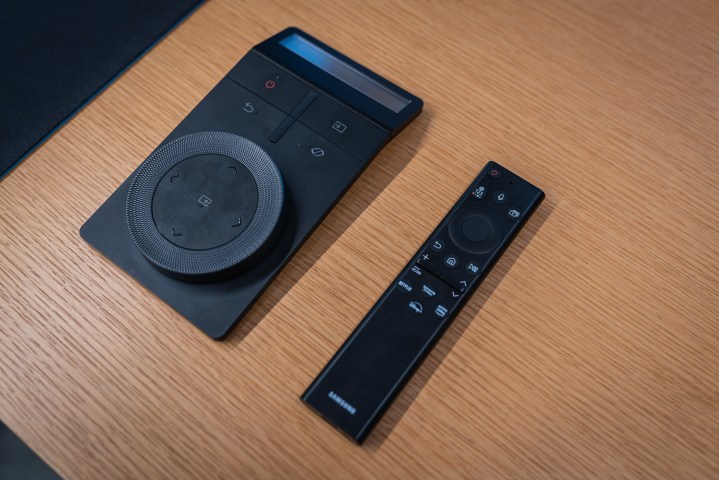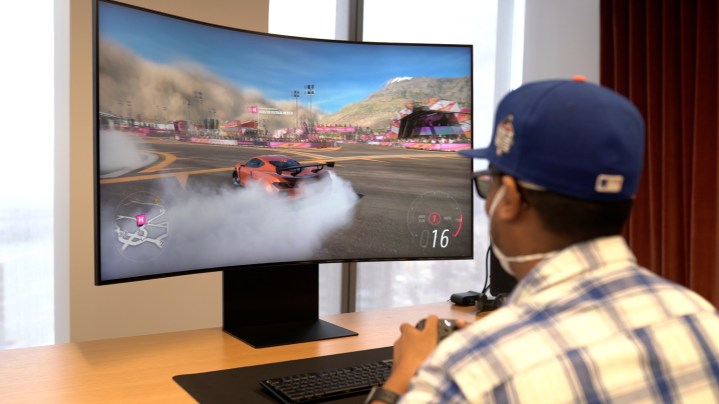I tried out the incredible Samsung Odyssey Ark, and it has one big problem
Samsung's 55-inch vertical Odyssey Ark is coming soon, but it has a big problem standing in its way: Windows and MacOS.

Samsung Odyssey Ark is finally coming — in fact, you can reserve a unit now for when the monitor goes on sale in early September. It floored me when I saw the display at CES, and it was equally as impressive seeing it a second time. But then I tried to use it with Windows.
Ark is a 55-inch rotating mini LED monitor that stands out with its ability to stack several windows either horizontally or vertically, and it’s one of the most anticipated monitors of 2022. The practicality of doing that with a Windows or Mac computer is up for question, though, especially considering Samsung is asking for more money for the Ark than it ever has for a gaming monitor.
Hands-on video
Samsung Odyssey Ark specs
| Screen size | 55 inches |
| Panel type | Mini LED |
| Resolution | 3,840 x 2,160 (4K) |
| Peak brightness | 2,000 nits |
| HDR | Yes |
| Response time | 1ms GtG |
| Refresh rate | 165Hz |
| Curve | 1000R |
| Speakers | 2.2.2 channels, 60W |
| Inputs | 4x HDMI 2.1 |
| USB ports | N/A |
| Adjustments | Height, tilt, swivel |
| List price | $3,499 |
The ‘Omni-Screen’
Before getting to the issues Windows and MacOS impose on the Ark, it’s important to set the scene. Because frankly, the Ark is a pretty unique product.
I’m calling it an Omni-Screen because that’s really what it’s trying to do. You can flip the 55-inch display vertically, sure, but Samsung is targeting a similar purpose as the Odyssey G9 Neo. The Ark is meant to replace several monitors with a single display, which is enabled by Samsung Multi-View, which allows you to position and resize windows around the screen.
The linchpin is a wireless Ark dial. It’s the command hub for the Ark, allowing you to resize your windows by turning the wheel or accessing Multi-View to bring in several apps at once. You can even save three layouts in the monitor for quick reference, and you can turn on some dynamic backgrounds to fill in the dead space of the display. And, when you rotate the monitor vertically, all of your apps will automatically adjust to the orientation.
 Jacob Roach / Digital Trends
Jacob Roach / Digital TrendsWith Samsung’s latest TV OS, you have access to basically any streaming app you could want, a web browser, and even Samsung Gaming Hub, which includes apps like Stadia, GeForce Now, and Game Pass. Otherwise, you have four HDMI 2.1 ports to hook up your sources, which is more than enough even if you have all of the latest consoles and a gaming PC.
It sounds perfect, and when I demoed the monitor at CES, that was the impression I had. The reality is a little bit different, though. Having a mix of apps and sources is great, but Ark starts to look a lot less practical if you’re mostly using a computer for all of your multitasking.
Keep it in the family
 Jacob Roach / Digital Trends
Jacob Roach / Digital TrendsThe Ark isn’t a TV and it isn’t a monitor, and when I asked Samsung about that dynamic, the response was clear: “It’s a screen.” That said, the Ark works best when you keep the experience centralized around Samsung’s TV operating system, utilizing the included apps and multiple sources instead of relying on a single source.
Ark can do a lot, including stacking three 27-inch screens on top of each other and allowing you to resize screens from a 16:9 aspect ratio to 21:9 or even 32:9. You can also resize windows down to 27 inches and freely move them around the 55-inch display. That’s only if you’re using Samsung’s apps, though.
Using Ark as a monitor presents a big hurdle. If you’re just using a PC or Mac, you can’t use the Ark dial or any of the layout features the monitor has. Windows and MacOS don’t have support for this kind of unique form factor, so getting everything set up is a process of manually resizing windows and going into your settings whenever you want to flip the display.
The main drawback is using apps like the web browser.
There’s not much Samsung can do about how Windows or MacOS work, but this issue definitely takes the shine off of a screen that’s meant to replace several disparate monitors. On top of that, you can’t run multiple cables from the PC to treat them as different sources. You get one feed for your PC or Mac. That’s it.
Samsung includes a remote with the display, so it’s very reasonable to have a streaming app like Netflix in one window and a game or web browser in another. The main drawback is using apps like the web browser, which you need to control with the Ark dial or remote.
It’s possible to control these apps with a keyboard and mouse via Bluetooth, but then that requires you have two connections on your peripherals synced up to your computer and the monitor at the same time. It’s just a lot of manual adjustment.
 Jacob Roach / Digital Trends
Jacob Roach / Digital TrendsIt’s true that the Odyssey Ark solves a similar problem as the Odyssey G9 Neo, but it does that in a very different way. With the G9’s 32:9 aspect ratio, you have loads of horizontal screen real estate to play with, and Windows and MacOS can easily accommodate you. The vertical flip on Ark is what throws this system off.
A stomach-churning price
 Jacob Roach / Digital Trends
Jacob Roach / Digital TrendsAlthough there are some practical issues, the Odyssey Ark is still impressive. It’s crazy that Samsung even got this display working in the first place, and the panel quality is up there with the highest-end gaming monitors available today. You’re getting a 1,000,000:1 contrast ratio and 2,000 nits of peak brightness, so this is certainly the cream of the crop available now.
And it should be considering how much Samsung is asking for the Ark. You can reserve a unit now for $3,500, and it will be available in early September. That’s $1,200 more than the Odyssey G9 Neo and even the same price as some of Samsung’s 8K QLED TVs. The Ark is a unique product, and Samsung clearly knows that.
There’s definitely an argument for the Ark. It could be your only screen, especially if you have several media devices and want to mix and match apps on the same display. But in reality, it’s hard to stomach the absolutely insane price, especially when the Ark isn’t nearly as useful or practical as the 32:9 Odyssey G9 Neo.

 BigThink
BigThink 































